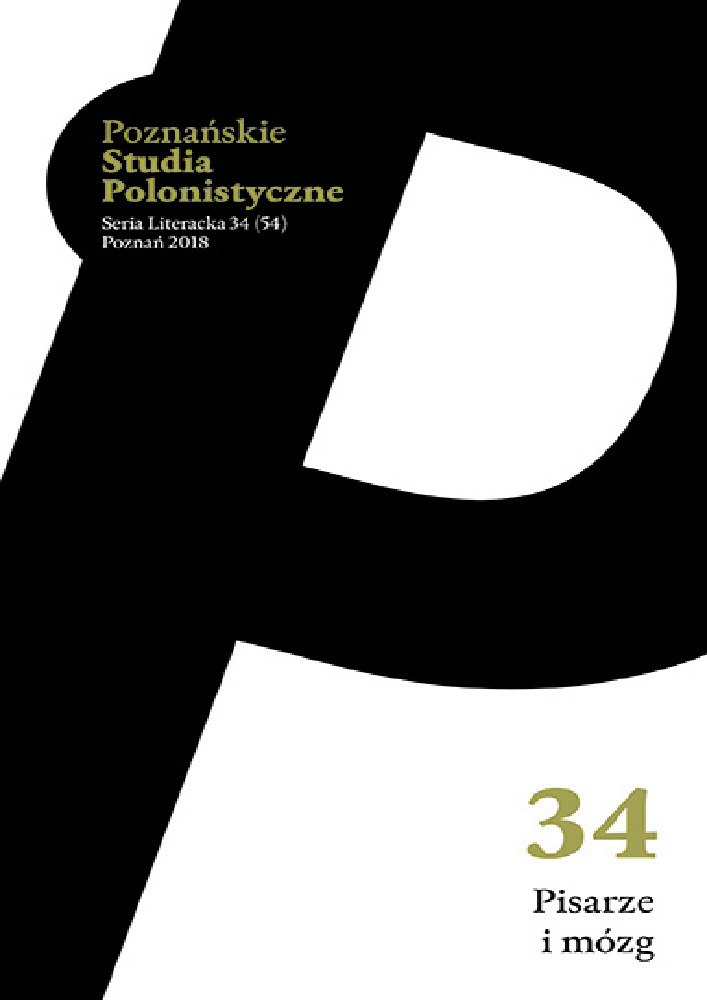Abstrakt
The claim here is that cultural representations of dementia may benefit from the structure of crime fiction which appears therefore to be among the theme most suited genres. We do not know enough about the disease or its etiology (the “culprit” remains unknown), hence the situation of the sufferer befits that of enigma or suspense, fear or confusion, doubt and presumption, standardly deployed by detective stories. Crime fiction narratives underscore that which is at stake in dementia: the riddle of disappearing of the person affected, the puzzle of memory loss, the identity doubt which extends to the relative when he or she is not recognized by the sufferer. By turning to a detective genre, Alzheimer’s novel profits from the genre’s growing popularity, owing to the reading public’s demand for challenges enhancing “mind reading” competences and training predictive abilities. The latter are more in demand as neurocognitive standards of readers grow.
Bibliografia
Basting Ann (2009), Forget Memory: Creating Better Lives for People with Dementia, Johns Hopkins University Press, Baltimore [USA].
Bertoni Alberto (2011), Un purosangue di Longchamp, w: Recordare, red. Roberto Aperoli, Alberto Bertoni, Incontri Editrice, Sassuolo [Włochy].
Bertoni Alberto (2016), Ricordi di Alzheimer. Una storia. Con una nota di Milo De Angelis e una poesia pavanese di Francesco Guccini, BOOK Editore, Milano [Włochy].
Calabrese Stefano (2017), La fiction e la vita. Lettura, benessere, salute, Mimesis, Milano [Włochy].
De Smet Peter [właśc. Hendrik Groen] (2016), Dopóki życie trwa. Nowy sekretny dziennik Hendrika Groena, lat 85, przeł. Ryszard Turczyn, Albatros, Warszawa.
DeBaggio Thomas (2002), Losing my Mind, The Free Press, London [Wielka Brytania].
Eco Umberto (2003), O literaturze, przeł. Joanna Ugniewska, Anna Wasilewska, MUZA, Warszawa.
Geeraerts Jef (1985), De zaak Alzheimer, Manteau, Brussel [Belgia].
Geiger Arno (2013), Stary król na wygnaniu, przeł. Karolina Niedenthal, Świat Książki, Warszawa.
Genova Lisa (2014), Motyl, przeł. Łukasz Dunajski, Wydawnictwo Filia, Poznań.
Healey Emma (2014), Ani śladu Elizabeth, przeł. Małgorzata Hesko-Kołodzińska, Media Rodzina, Poznań.
Herling-Grudziński Gustaw (1997), Gorący oddech pustyni, w: tegoż, Gorący oddech pustyni, Czytelnik, Warszawa, s. 62-89.
Ignatieff Michael (1993) Scar Tissue, Vintage, New York [USA].
Johnstone Megan-Jane (2013), Metaphors, Stigma and the “Alzheimerization” of the Euthanasia Debate, „Dementia”, nr 12/1, s. 377-393.
Jolley David J., Benbow Susan M. (2000), Stigma and Alzheimer’s Disease: Causes, Consequences and a Constructive Approach, „International Journal of Clinical Practice”, nr 54/2, s. 117-119.
Kontos Pia C. (2003),“The Painterly Hand”: Embodied Consciousness and Alzheimer’s Disease, „Journal of Aging Studies”, nr 17, s. 151-170.
Kontos Pia C. (2004), Embodied Selfhood: Redefining Agency in Alzheimer’s Disease, w: Old and Agency, red. Emmanuelle Tulle, Hauppage, New York [USA], s. 105-121.
Kontos Pia C. (2006), Embodied Selfhood. An Ethnographic Exploration of Alzheimer’s Disease, w: Thinking about Dementia. Culture, Loss,and the Anthropology of Senility, Rutgers University Press, New Brunswick [USA], s. 195-217.
Kontos Pia C. (2015), Dementia and Embodiment, w: Routledge Handbook of Cultural Gerontology, red. Julia Twigg, Wendy Martin, Routledge, London [Wielka Brytania], s. 173-180.
LaPlante Alice (2011), Turn of Mind, Atlantic Monthly Press, New York [USA].
Lehne Moritz, Koelsch Stefan (2015), Toward a general psychological model of tension and suspense, „Frontiers in Psychology”, nr 6, s. 1-11.
Lippolis Maristella (2013), Una furtiva lacrima, Piemme, Milano [Włochy].
McEwan Ian (2001), Pokuta, przeł. Andrzej Szulc, Albatros, Warszawa.
Mortier Erwin (2011), Pieśni bełkotu. Mamine godzinki, przeł. Łukasz Żebrowski, W. A. B., Warszawa.
Nicpan Łukasz (2015), Kto to?, w: tegoż, Ostatnie dni lata, VEDA, Warszawa, s. 10-11.
Pagano Flavio (2013), Perdutamente, Giunti, Firenze [Włochy].
Post Stephen (1995), The Moral Challenge in Alzheimer’s Disease: Ethical Issues from Diagnosis to Dying, Johns Hopkins University Press, Baltimore [USA].
Ricaldone Luisa (2017), Ritratti di donne da vecchie, Iacobelli, Guidonia [Włochy].
Sontag Susan (1999), Choroba jako metafora. AIDS i jego metafory, PIW, Warszawa.
Suter Martin (2003), Small World, przeł. Sandra Harper, Random House, London [Wielka Brytania].
Swinnen Aagje (2015), Ageing in film, w: Routledge Handbook of Cultural Gerontology, red. Julia Twigg, Wendy Martin, Routledge, London [Wielka Brytania], s. 69-76.
Swinnen Aagje, Schweda Mark, red. (2015), Popularizing Dementia. Public Expressions and Representations of Forgetfulness, Transcript Verlag, Bielefeld [Niemcy].
Wulff Hans J. (2008), Als segelte ich in die Dunkelheit… Die ästhetische und dramatische Analyse der Alzheimer-Krankheit im Film, „Jahrbuch Literatur und Medizin”, red. Bettina von Jagow, Florian Steger, [online] Heidelberg [Niemcy], [dostęp: 12 lutego 2017], http://www.derwulff.de/files/2-151.pdf.
Zeilig Hannah (2014), Dementia As a Cultural Metaphor, „The Gerontologist”, vol. 54, nr 2, s. 258-267.
Zunshine Lisa (2006), Why We Read Fiction. Theory of Mind and the Novel, The Ohio State University Press, Columbus [USA].
Zunshine Lisa (2014), „Theory of Mind” as a Pedagogical Tool, „Interdisciplinary Literary Studies”, nr 16.1, s. 89-109.
Filmografia
De zaak Alzheimer (2003), reż Erik Van Looy.
Remember (2015), reż. Atom Egoyan.
Small World (2010), reż. Bruno Chiche.
Szalona rodzinka (1992), reż. Ted Kotcheff.
Licencja
Autorzy
Autorzy tekstów przyjętych do publikacji w czasopiśmie „Poznańskie Studia Polonistyczne. Seria Literacka” są zobowiązani do wypełnienia, podpisania i odesłania na adres redakcji umowy o udzielenie nieodpłatnej licencji do utworów, z zobowiązaniem do udzielania sublicencji CC.
Zgodnie z umową, autorzy tekstów opublikowanych w czasopiśmie „Poznańskie Studia Polonistyczne. Seria Literacka” udzielają Uniwersytetowi im. Adama Mickiewicza w Poznaniu niewyłącznej i nieodpłatnej licencji oraz zezwalają na użycie sublicencji Creative Commons Attribution-NoDerivatives 4.0 International (CC BY-ND 4.0).
Autorzy zachowują prawa do dalszego, swobodnego rozporządzania utworem.
Użytkownicy
Zainteresowani użytkownicy internetu uprawnieni są do korzystania z utworów opublikowanych od 2016 roku w „Poznańskich Studiach Polonistycznych. Serii Literackiej” pod następującymi warunkami:
- uznanie autorstwa – obowiązek podania wraz z rozpowszechnionym utworem, informacji, o autorstwie, tytule, źródle (odnośniki do oryginalnego utworu, DOI) oraz samej licencji;
- bez tworzenia utworów zależnych – utwór musi być zachowany w oryginalnej postaci, nie można bez zgody twórcy rozpowszechniać np. tłumaczeń, opracowań.
Do wszystkich tekstów opublikowanych przed 2016 r. prawa autorskie są zastrzeżone.
Inne
Uniwersytet im. Adama Mickiewicza w Poznaniu zachowuje prawo do czasopisma jako całości (układ, forma graficzna, tytuł, projekt okładki, logo itp.).
